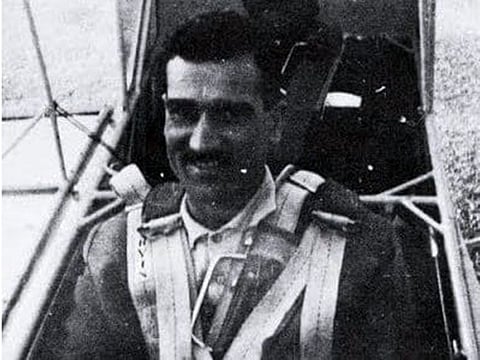Son of ex-Syrian president says he knows where Israeli spy Eli Cohen is buried
Khaled Al Hafez wants Israel to pay him $1 million for the information but is turned down

Damascus: The son of ex-President Amin Al Hafez has reached out to Israel, saying that he knows exactly where the remains of Israeli spy Eli Cohen are buried in Damascus. To reveal full information, the New Zealand-based Khaled Al Hafez is asking for “a minimum” of $1 million.
Cohen was an Israeli spy working undercover in Syria in the early 1960s, using the alias “Kamel Amin Thabet.” He was arrested in January 1965 and hanged four months later, during Amin Al Hafez’s presidency.
The Israeli press claims that Mossad has turned down Khaled Al Hafez’s offer, prompting Cohen’s 85-year old widow, Nadia, to contact Mossad chief Yossi Cohen and find out what happened.
“He’s not worth the price?” she asked.
“They didn’t want to look into it? I want him (Yossi Cohen) to tell me what this is all about.”
Meanwhile, Sophie Ben-Dor, Cohen’s daughter, told Maariv that Mossad did not officially approach the family with Hafez’s offer.
“We heard the story for the first time together with everyone else, and we were completely shocked” she said.
“We turned to Mossad but didn’t hear back from them. We’re very pained by this”
Unknown gravesite
“More than half a century has passed, and all those who were in power the time are now dead” said veteran Syrian journalist Hani Al Khayyer, who attended Cohen’s execution.
“The last of the dead is Amin Al Hafez himself, who passed away in Aleppo in December 2009.”
Speaking to Gulf News, Khayyer said: “Without these witnesses, defining the exact location of Cohen’s grave would be extremely difficult.”
Khayyer, who subsequently published a book about Cohen, added: “He was initially buried in one place, and for security reasons, immediately moved from one location to another, over the many years.”
That claim was supported by Munzer Al Mousilli, Amin Al Hafez’s bureau chief, who also published a book about Cohen back in 2005.
“The exact location of his remains are unknown. They were moved around frequently.”
“I don’t believe that the son of Amin Al Hafez knows anything at all about the burial place of Cohen,” said Nikolaos Van Dam, a celebrated Dutch scholar and author of “The Struggle for Power in Syria” which touches upon Hafez’s presidency (1963-1966).
Speaking to Gulf News, he explained: “The late president denied knowing anything about it, and his son would know even less than zero about it.”
Great controversy
Cohen’s remains have been a subject of great controversy since his May 18, 1965 execution in downtown Damascus.
His widow has even since been constantly asking for their return, even appealing to former Syrian President Hafez Al Assad during the Syrian-Israeli peace process back in the 1990s.
In 2018, Mossad managed to recover his wristwatch from Syria.
“I don’t want to do this for Mossad,” said Khaled Al Hafez.
“I want to do it to help the wife and children of Cohen.”
Much has been rumored about Amin Al Hafez’s friendship with Cohen, whom he reportedly helped bring to Syria in 1962, thinking he was a wealthy Syrian émigré living in Argentina.
Although speaking to Al Jazeera TV in 2001, President Hafez denied having ever met Cohen before his January 1965 arrest in Damascus.
“I only saw him one time, during the interrogation” he said.
In a 2019 Netflix production about Cohen called “The Spy,” both Amin Al Hafez and his wife are shown attending Cohen’s execution, which is factually incorrect
Sign up for the Daily Briefing
Get the latest news and updates straight to your inbox




